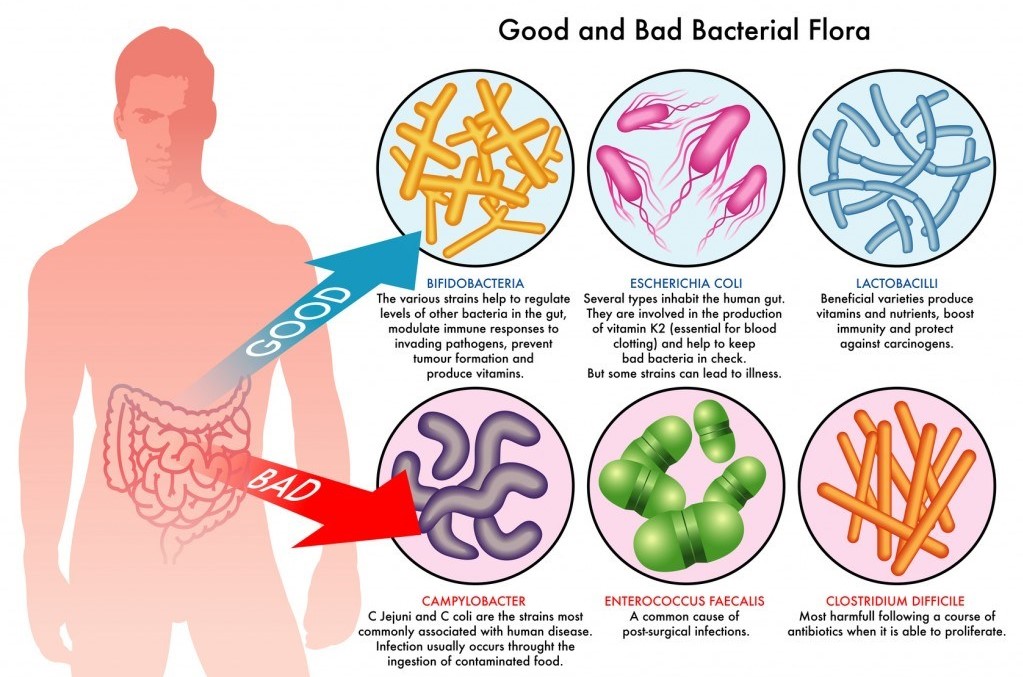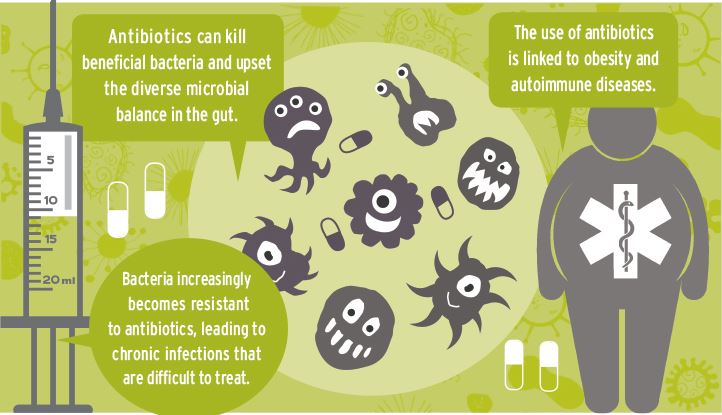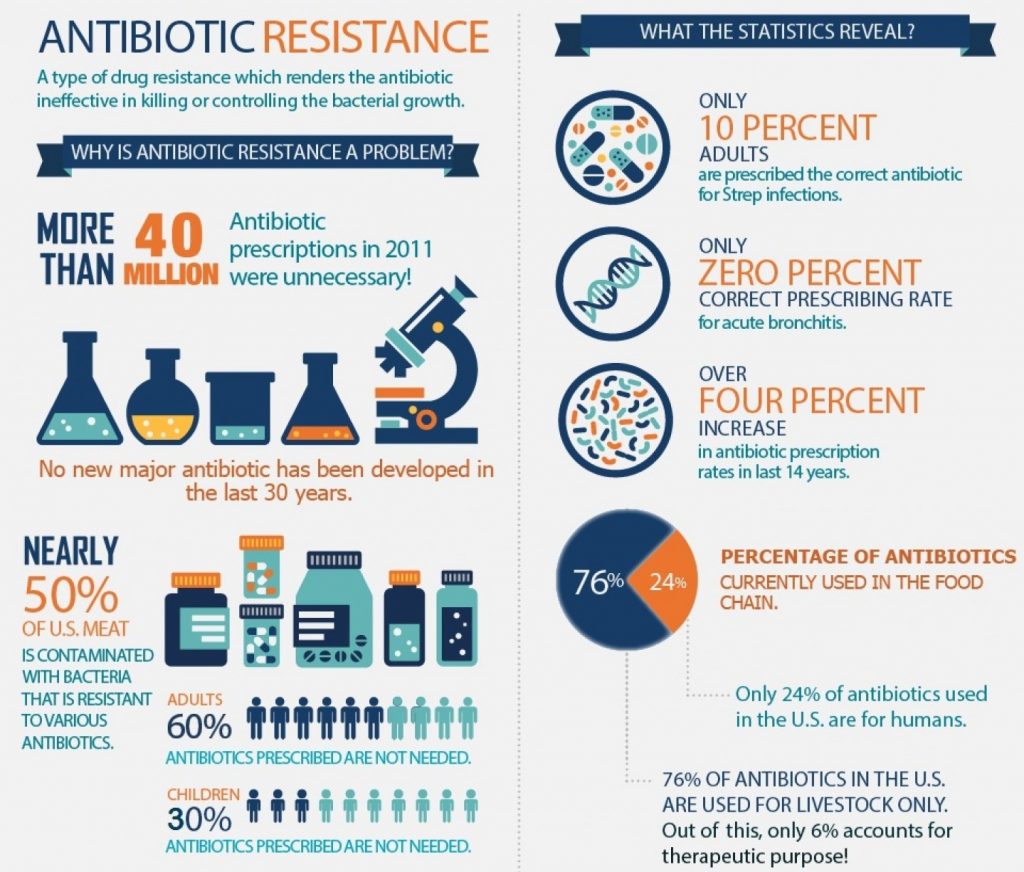Educating and Empowering You to Heal, Thrive, and Live a Happy, Healthy Lifestyle
The Best Natural Antibiotics
 Antibiotics are one of the most commonly prescribed drugs. They have obviously saved lives as they can eliminate infections that could be deadly. Unfortunately, they are vastly overused and often prescribed unnecessarily, especially for viral infections, colds, flu, sinus infections, and other conditions they were never meant to treat.
Antibiotics are one of the most commonly prescribed drugs. They have obviously saved lives as they can eliminate infections that could be deadly. Unfortunately, they are vastly overused and often prescribed unnecessarily, especially for viral infections, colds, flu, sinus infections, and other conditions they were never meant to treat.
Antibiotic use is becoming more specific “a drug for every bug” and can be life-saving in isolated cases. Unfortunately, they are over-prescribed and their use does not come without side effects and significant impacts on the body.
The Side Effects of Antibiotics
Antibiotics deplete the body of healthy flora (the friendly, good bacteria) that resides in the gut and on the surface of the skin. These bacteria help to maintain a healthy immune system. Repeated use significantly compromises the gut and immune system. Since 70-80% of the cells in our immune system are found in the gut, it isn’t surprising that autoimmune diseases are on the rise with increased antibiotic use.
And, let’s not forget about the gut-brain connection. Anything that affects the gut always affects the brain: an inflamed gut = an inflamed brain; an irritable gut = an irritable brain; an infected gut = an infected brain; a leaky gut = a leaky blood brain barrier.
“The primary seat of insanity generally is in the region of the stomach and intestines.” – Phillipe Pinel, French psychiatrist (1745-1826) known as the father of modern psychiatry
After just one round of antibiotics, risk for major depressive disorder increases 23-56% and risk of anxiety increases 17-44%. [J Clin Psychiatry. 2015 Nov;76(11):1522-8]
The more antibiotics you take (or have taken over the years), the greater the dysfunction in your gut, immune system and brain.
Antibiotics decrease the ability to excrete mercury, a neurotoxin. They kill all the good bacteria along with the bad leaving you susceptible to colonization by pathogens such as Candida overgrowth, yeast, parasites, H pylori, C diff, and other dysbiotic bacteria, which leads to other problems in the body.
 Antibiotic use also causes depletion in several important nutrients including zinc, magnesium, calcium, biotin, inositol, B1, B2, B3, B6, B12, and vitamins C, E and K.
Antibiotic use also causes depletion in several important nutrients including zinc, magnesium, calcium, biotin, inositol, B1, B2, B3, B6, B12, and vitamins C, E and K.
A study conducted at Henry Ford Hospital in Detroit, Michigan shows that children given antibiotics in their first six months of life have an increased risk of allergies to ragweed, pets, grass, and dust mites. They also have an increased risk of asthma and autoimmune disease.
Early exposure to antibiotics in the first 15 months of life increases the risk of developing Crohn’s disease.
An infant gets their first inoculation of gut flora from the mother’s birth canal during childbirth, which is why a mother’s use of antibiotics during pregnancy may predispose the child to asthma and a variety of other ailments, including neurological dysfunction and autoimmune disorders.
Researchers at Karolinska Institute in Sweden found a strong connection between antibiotic use and the onset of celiac disease.
Taking antibiotics just 5 times within 15 years makes you 50% more likely to develop diabetes!
There’s a direct relationship between long-term antibiotic use and breast cancer. – Dietrich Klinghardt, MD, PhD

Just one course of antibiotics negatively alters your microbiome for up to one year! –mBio
Another study published in PLoS One, found that just one course of antibiotics caused negative changes in the microbiotia for up to four years post treatment.
In addition, four years after treatment high levels of the macrolide resistance gene erm(B) were found, indicating antibiotic resistance.
Macrolide antibiotics (azithromycin (Zithromax), clarithromycin (Biaxin), quinolone, and erythromycin) increase the risk of sudden cardiac death. In a meta-analysis of nearly 21 million people, these antibiotic drugs were linked to cardiac arrhythmias and a significant cardiovascular risk.
Fluoroquinolones may be the deadliest antibiotics of all. They can cause mitochondrial dysfunction, serious blood sugar disturbances, neurological dysfunction, mental health side effects and psychiatric problems including anxiety, depression, psychosis, hallucinations, insomnia, tremors, seizures, memory loss, bipolar disorder, disturbances in attention, disorientation, agitation, nervousness, memory impairment and delirium and more! Every single one of these neuropsychiatric symptoms have been reported as a side effect of fluoroquinolones in many of those suffering from fluoroquinolone toxicity.
 The excessive overuse of antibiotics has led to “superbugs” that are becoming increasingly resistant to even the most powerful antibiotics that are used to treat not just farm animals, but humans as well.
The excessive overuse of antibiotics has led to “superbugs” that are becoming increasingly resistant to even the most powerful antibiotics that are used to treat not just farm animals, but humans as well.
You eat what the animal ate! Whether you take prescription antibiotics or if you consume factory-farmed, antibiotic-tainted animal protein sources, you’re getting the side effects of antibiotics. Livestock consume up to 80% of the antibiotics used in the U.S. Therefore, if you consume animal protein, eggs or dairy products, it’s crucial that they’re antibiotic-free, organic, pasture-raised, and grass-fed sources.
Glyphosate, a toxic pesticide is sprayed on non-organic food is patented as an antibiotic.
“The risks of potential side effects need to be weighed against the potential benefit that antibiotics provide. This is especially pertinent as usage of placebos have been shown to be almost as efficacious and much safer than antibiotic therapy.” – Kelly Brogan, MD
The Best Natural Antibiotics
Science has shown the following antibiotic alternative (natural antimicrobials) to be more effective in resolving bacterial infections and imbalances without the side effects of pharmaceutical antibiotics.
- Oil of oregano (emulsified ADP)
- Garlic
- Onions
- Pau ‘d arco
- Grapefruit seed extract
- Colloidal silver
- Olive leaf
- Berberine
- Uva Ursi
- Turmeric
- Ginger
- Raw honey (organic and locally-grown is best)
- Intravenous vitamin C
- Sunlight! “The majority of microbes that cause airborne infections cannot tolerate sunlight.” – Journal of Hospital Infection
- UV lighting
- Niacinamide; a one-time large dose of 80mg/kg can stimulate the thymus gland
- Essential oils: frankincense, thyme, clove, oregano, tea tree, lavender, cinnamon
Take away
- Antibiotics should be used sparingly and only when absolutely necessary. If you use antibiotics when you really don’t need them, they may not work when you do need them.
- If you need to take antibiotics, be sure to ‘feed and reseed’ your gut with a high-quality, multi-strain probiotic.
- Take HCL with meals to aid in digestion, break down food, manage the gas associated with bacterial fermentation in the gut, and inhibit an environment for infections to thrive and survive.
- Anyone using antibiotics should be on a full complement of vitamins, minerals, probiotics, and all other essential food factors to help protect against the side effects.
- Avoid things known to disrupt or destroy your microbiome:
- Factory-farmed meats and other animal products; CAFO animals are routinely fed low-dose antibiotics, genetically engineered, and glyphosate-treated grains
- Non-organic foods (if you’re not eating organic, you’re eating chemicals, GMOs and glyphosate that destroy healthy gut flora and damage your microbiome
- Processed foods (excessive sugars feed pathogenic bacteria)
- Chlorinated and fluoridated water
- Antibacterial soap, hand gels, wipes and products containing triclosan, an antibacterial chemical that has been linked to hormone disruption, estrogen dominance, thyroid problems, liver toxicity, allergies, and antibiotic-resistance.
“All disease starts in the gut.” – Hippocrates
Healthy digestion, good bacteria (flora), sufficient levels of stomach acid, and optimizing your microbiome is crucial in how you think, feel and function, your weight, reducing symptoms of autoimmune disease, depression, anxiety, brain fog, fatigue, gas, bloating, sugar and carb cravings, minimizing food sensitivities, and your risk of diabetes, autism, and even cancer.
Related Articles
- Video: Use this to strengthen your immune system against infection
- The Healing Power of Probiotics
- Natural Remedies for Sinus Infections + a Neti-pot recipe
- Boost Your Immune System – Avoid these Immune Suppressors
- Parasites (more common than you think!): Causes, Symptoms and Solutions
- Video: Watch this if you’ve used Antibiotics

